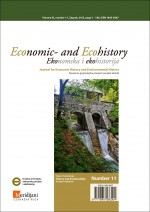Sustaining sustainable development: The shifting moral base of the concept, 1972-2002
Sustaining sustainable development: The shifting moral base of the concept, 1972-2002
Author(s): J. A. Du PisaniSubject(s): Energy and Environmental Studies, Social differentiation, Human Ecology, Political Ecology, Economic development, Environmental interactions, Socio-Economic Research
Published by: Društvo za hrvatsku ekonomsku povijest i ekohistoriju - Izdavačka kuća Meridijani
Keywords: sustainable development; environmental conservation; poverty alleviation; African perspective;
Summary/Abstract: This article traces the shift in the moral arguments in the sustainable development discourse, which occurred between 1972 and 2002. In the early 1970s ecological considerations were dominant and the zero-growth option had strong support. By the end of the 1980s the influential report of the Brundtland Commission recommended that the balance between the ecological, economic and social aspects of sustainable development ought to be maintained. From the 1990s there was a shift to poverty alleviation as the main focus of the sustainable development discourse. Representatives of the developing countries started making contributions to the evolution of the concept of sustainable development and succeeded in merging the sustainable development discourse into the wider North-South debates. A decrease in wealth rather than a decrease in poverty would be the correct approach to the achievement of sustainable development. However, such a radical change of direction would only be possible once considerable progress has been made towards redressing the imbalances in the gloabal distribution of wealth.
Journal: Ekonomska i ekohistorija - Časopis za gospodarsku povijest i povijest okoliša
- Issue Year: 2015
- Issue No: 11
- Page Range: 19-32
- Page Count: 14
- Language: English

